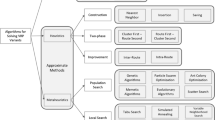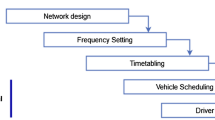Abstract
Particle Swarm Optimization (PSO) has emulated the social behaviour of some animals such as a flock of birds and a school of fish, searching for food. This communicative sociality when modelled as computational procedure has solved a wide range of complex problems. Over the years, PSO has undergone transformations and numerous variants have come up. In this paper, PSO has been hybridized with two new algorithms to solve the fixed charge transportation problem to minimize the transportation cost (variable and fixed) of delivering goods while satisfying supply/demand constraints. The method considers the reduction of objective function defined by Balinski, Adlakha et al., Yousefi et al. and is incorporated within the PSO. An independent approach of solving the problem on the basis of variable cost initially followed by addition of fixed cost has also been explored. It was observed that proposed PSO works best without reducing the objective function. The simulation results reveal a substantial gain of the proposed method in terms of its efficiency and effectiveness examined on different test problems. To validate the claims, the proposed PSO has also been compared with the solutions attained by other existing methods (either exact or heuristics).


Similar content being viewed by others
References
Adlakha V, Kowalski K (2003) A simple heuristic for solving small fixed-charge transportation problems. Omega 31(3):205–211
Adlakha V, Kowalski K, Vemuganti R (2006) Heuristic algorithms for the fixed-charge transportation problem. Opsearch 43(2):132–151
Adlakha V, Kowalski K, Wang S, Lev B, Shen W (2014) On approximation of the fixed charge transportation problem. Omega 43:64–70
Akbari M, Molla-Alizadeh-Zavardehi S, Niroomand S (2020) Meta-heuristic approaches for fixed-charge solid transportation problem in two-stage supply chain network. Oper Res 20(1):447–471
Balinski ML (1961) Fixed-cost transportation problems. Naval Res Logistics Q 8(1):41–54
Barr RS, Glover F, Klingman D (1981) A new optimization method for large scale fixed charge transportation problems. Oper Res 29(3):448–463
Cabot AV, Erenguc SS (1984) Some branch-and-bound procedures for fixed-cost transportation problems. Naval Resh Logistics Q 31(1):145–154
Chen J, Pan F, Cai T (2006) Acceleration factor harmonious particle swarm optimizer. Int J Automation Comput 3(1):41–46
Clerc M, Kennedy J (2002) The particle swarm-explosion, stability, and convergence in a multidimensional complex space. IEEE Trans Evolut Comput 6(1):58–73
Eberhart R, Kennedy J (1995) A new optimizer using particle swarm theory. In: Proceedings of the Sixth International Symposium on Micro Machine and Human Science, pp. 39–43. Nagoya, Japan
El-Sherbiny MM, Alhamali RM (2013) A hybrid particle swarm algorithm with artificial immune learning for solving the fixed charge transportation problem. Comput Ind Eng 64(2):610–620
Fakhrzad MB, Goodarzian F, Golmohammadi A (2019) Addressing a fixed charge transportation problem with multi-route and different capacities by novel hybrid meta-heuristics. J Ind Syst Eng 12(1):167–184
Fernandez-Martinez JL, Garcia-Gonzalo E (2011) Stochastic stability analysis of the linear continuous and discrete pso models. IEEE Trans Evolutionary Comput 15(3):405–423
Garg H (2016) A hybrid pso-ga algorithm for constrained optimization problems. Appl Math Comput 274:292–305
Garg H (2019) A hybrid gsa-ga algorithm for constrained optimization problems. Inf Sci 478:499–523
Gazi V, Passino KM (2004) Stability analysis of social foraging swarms. IEEE Trans Syst Man Cybernetics Part B (Cybernetics) 34(1):539–557
Gottlieb J, Paulmann L (1998) Genetic algorithms for the fixed charge transportation problem. In: Evolutionary Computation Proceedings, 1998. IEEE World Congress on Computational Intelligence., The 1998 IEEE International Conference on, pp. 330–335. IEEE
Gray P (1971) Exact solution of the fixed-charge transportation problem. Oper Res 19(6):1529–1538
Hirsch WM, Dantzig GB (1968) The fixed charge problem. Naval Res Logistics Q 15(3):413–424
Hitchcock F (1941) The distribution of a product from several sources to numerous locations. J Math Phys 20:224–230
Huang H, Zhifang H (2009) Particle swarm optimization algorithm for transportation problems. Particle Swarm Optimization, Intech, Shanghai, pp 275–290
Ide A, Yasuda K (2005) A basic study of adaptive particle swarm optimization. Electr Eng Japan 151(3):41–49
Kadirkamanathan V, Selvarajah K, Fleming PJ (2006) Stability analysis of the particle dynamics in particle swarm optimizer. IEEE Trans Evolutionary Comput 10(3):245–255
Koopmans T (1947) Optimum utilization of the transport system. In: Proceedings of International Statistical Conferences : Econometric, pp. 136–145
Lotfi M, Tavakkoli-Moghaddam R (2013) A genetic algorithm using priority-based encoding with new operators for fixed charge transportation problems. Appl Soft Comput 13(5):2711–2726
Madenoğlu, FS (2021) Managing transportation in supply chain: Metaheuristics for solving a capacitated fixed-charge transportation problem. In: Handbook of Research on Recent Perspectives on Management, International Trade, and Logistics, pp. 198–218. IGI Global
Murty KG (1968) Solving the fixed charge problem by ranking the extreme points. Oper. Res. 16(2):268–279
Palekar US, Karwan MH, Zionts S (1990) A branch-and-bound method for the fixed charge transportation problem. Manag Sci 36(9):1092–1105
Pop P, Matei O, Sitar CP, Zelina I (2016) A hybrid based genetic algorithm for solving a capacitated fixed-charge transportation problem. Carpath J Math 32:225–232
Qin Z, Yu F, Shi Z, Wang Y (2006) Adaptive inertia weight particle swarm optimization. In International conference on Artificial Intelligence and Soft Computing, pp. 450–459. Springer
Raj KAAD, Rajendran C (2011) A hybrid genetic algorithm for solving single-stage fixed-charge transportation problems. Technol Oper Manag 2(1):1–15
Ratnaweera A, Halgamuge SK, Watson HC (2004) Self-organizing hierarchical particle swarm optimizer with time-varying acceleration coefficients. IEEE Trans Evolut Comput 8(3):240–255
Robers P, Cooper L (1976) A study of the fixed charge transportation problem. Comput Math Appl 2(2):125–135
Sadagopan S, Ravindran A (1982) A vertex ranking algorithm for the fixed-charge transportation problem. J Optim Theory Appl 37(2):221–230
Sagratella S, Schmidt M, Sudermann-Merx N (2020) The noncooperative fixed charge transportation problem. Euro J Oper Res 284(1):373–382
Shi Y, Eberhart R (1998) A modified particle swarm optimizer. In: 1998 IEEE international conference on evolutionary computation proceedings. IEEE world congress on computational intelligence (Cat. No. 98TH8360), pp. 69–73. IEEE
Steinberg DI (1970) The fixed charge problem. Naval Res Logistics Q 17(2):217–235
Sun M, Aronson JE, McKeown PG, Drinka D (1998) A tabu search heuristic procedure for the fixed charge transportation problem. Euro J Oper Res 106(2–3):441–456
Tari FG, Hashemi Z (2018) Prioritized k-mean clustering hybrid ga for discounted fixed charge transportation problems. Comput Ind Eng 126:63–74
Van den Bergh F, Engelbrecht AP (2006) A study of particle swarm optimization particle trajectories. Inf Sci 176(8):937–971
Yousefi K, J Afshari A, Hajiaghaei-Keshteli M (2019) Solving the fixed charge transportation problem by new heuristic approach. J Optim Ind Eng 12(1):41–52
Author information
Authors and Affiliations
Corresponding author
Ethics declarations
Conflict of interest
The authors do not have any conflict of interest.
Additional information
Publisher's Note
Springer Nature remains neutral with regard to jurisdictional claims in published maps and institutional affiliations.
Rights and permissions
About this article
Cite this article
Singh, G., Singh, A. Solving fixed-charge transportation problem using a modified particle swarm optimization algorithm. Int J Syst Assur Eng Manag 12, 1073–1086 (2021). https://doi.org/10.1007/s13198-021-01171-2
Received:
Revised:
Accepted:
Published:
Issue Date:
DOI: https://doi.org/10.1007/s13198-021-01171-2





